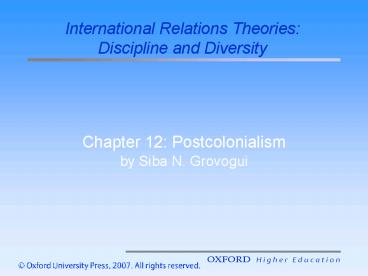Chapter 12: Postcolonialism by Siba N' Grovogui - PowerPoint PPT Presentation
1 / 10
Title:
Chapter 12: Postcolonialism by Siba N' Grovogui
Description:
Understand the applications of postcolonial thinking in international relations ... efforts to save the underprivileged as hiding colonial categories and tendencies ... – PowerPoint PPT presentation
Number of Views:1244
Avg rating:3.0/5.0
Title: Chapter 12: Postcolonialism by Siba N' Grovogui
1
Chapter 12 Postcolonialism by Siba N. Grovogui
International Relations Theories Discipline and
Diversity
2
Learning outcomes
- After this lecture you should be able to
- Understand the key principles of
postcolonial writing - Understand the key principles of Saids
Orientalism - Understand the applications of postcolonial
thinking in international relations theory and
international politics
3
Postcolonialsm
- Postcolonialism
- Highlights that in celebrating reason, science
and technology, the Europeans have degraded the
culture, arts and science in non-European
societies - Implicates academic disciplines with this process
and contests the Western rationalist, humanist
and universalist modes of thinking - Draws on a multiplicity of perspectives from
different regions, historical contexts and
academic disciplines
4
Knowledge and power
- Postcolonialism notes that knowledge and power
are intertwined - knowledge power
- Postcolonialism is sceptical of everyday
knowledge, expert knowledge as well as Western
efforts to save the underprivileged as hiding
colonial categories and tendencies
5
Challenging the Western canon
- Postcolonialists challenge classical Western
canon and draw three conclusions - We must note the political effects of categories
such as international order, society or ethics
derivative from colonial history - There are double movements of presence and
erasure in Western moral debates - 3) Postcolonialism is sceptical of the
objectivism and neutrality implied by Western
disciplinary narratives
6
Postcolonialism and International Relations
- Postcolonialism points to the forms of violence
that went with the European creation of
international order - In International Relations, postcolonialism
harbours a suspicion of the universalisms and
rationalizations of the liberals and the
mutuality and co-constitutions of norms
emphasised by the constructivists - Postcolonialism is associated with the study of
identity and culture in their fluid contexts.
They see both dangers and opportunities in their
transformation
7
Said and Orientalism
- Saids Orientalism emphasised the techniques of
power at work in Western language and
representations of the Middle East - One can utilise Saids framework in analysing
todays images of the Middle East as well as
those from the past - The war on terror can be seen to embody
particular definitions and discourses of
terrorism that arise from Orientalism - existence of separate hierarchical spheres of
civilisations, - need to defend Western values against corrupt
ones and - necessity of moderate Arabs to join the Western
framework - These, however, present a particular view of
history and present that distorts historical
co-dependencies and cultural nuances
8
Postcolonialsim on imperial legacy
- Postcolonial thinking requires that one is able
to challenge the disciplinary common sense. - The notion of Pax Britannica expresses British
empire in a positive light. Postcolonialism notes
that the experiences of the colonized differ
substantially from those of the colonisers - A postcolonial understanding of nuclear
non-proliferation treaties reveals that the
treaties, while inhibiting the ability of weaker
post-colonial states to gain arms, allow the
proliferation of nuclear arms in the possession
of the western states to go unnoticed.
9
Case study Suez Canal
- The accounts of the Suez Canal War still read as
stories of superpower balance of power and
recklessness of third world nationalism - To postcolonialists the decision of Britain,
France and Israel to wage war on Egypt was
illogical, and reckless in its own way Nasser
was right that the internationalization of Suez
was a throwback to European notions of imperial
sovereignty and went against the post-war notion
of self-determination
10
Conclusion
- Postcolonialism
- Seeks contingent and empathic
understandings of human trajectories and favours
egalitarianism, social justice and solidarity - Advances a different kind of universalism
based on deliberation and contestation amongst
diverse political entities - Notes the failure of the international
system to fully include postcolonial nations in
decision-making and is sceptical of hegemony,
unilateral rules and memory of international
relations - Recognises the fluidity and hybridity of
culture and identity






























